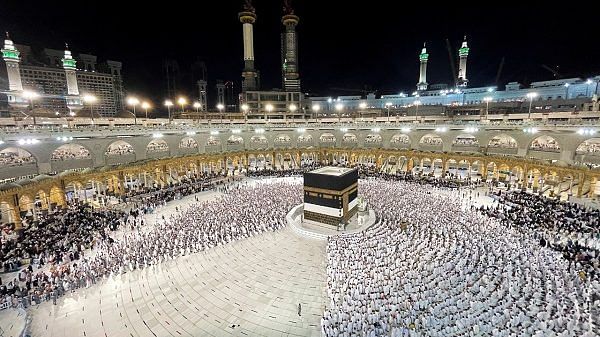About 100-150 years after Prophet Muhammad’s death in 632 AD, his sayings and works were compiled by various Islamic scholars into what is known as Hadith. After the Qur’an, the Hadith is considered as the second-most significant source of Islamic knowledge.
From Prophet Muhammad’s personality and his works (as mentioned in the first part of the series), it is clear that he was not only against any kind of birth-based discrimination but also made efforts to eliminate it.
Ironically, in several books of Hadith, there are many such sayings of Prophet Muhammad that support the idea of racism/casteism. For example, only a Quraysh (Sayyid, Sheikh) can be the Caliph, the people of the Quraysh tribe are the chieftains of all the Arab people, etc. It also describes (in Muhammad’s word) the professional/working castes like Thathera, Sunar, Weaver, Cobbler, Rangrez, etc. as evil, inferior and deceitful towards the Allah.
But one also finds the Prophet’s sayings where he completely opposes racism/casteism. For example, he has said that every Muslim is the brother of every other Muslim, and has described the act of taking pride in one’s Nasab (caste) or considering others as bad or inferior an act of ignorance.
The most prominent of these Hadith is quoted from the speech delivered by Prophet Muhammad on the occasion of his last Hajj, in which he said, “No Arab should be provided superiority over any Ajmi (people of other regions and castes) and nor any Ajmi should claim superiority over an Arab. Similarly there is no superiority of a white (person of fair complexion) over a black (person of dark complexion), nor does any black hold any superiority over any other white. I am leaving among you the Book of Allah (Qur’an) and My Way. If you hold them firmly, you will never be misled even when I am gone.”
This khutba (speech) was delivered while Prophet Muhammad was addressing an assembly of about 1.25 lakh people, in which there is a strong opposition to racism. Some people associated with the Pasmanda movement also consider it to be at the core of the movement.
Also read: Quran has no space for casteism but Ashraaf Muslims interpret it differently
Ashraaf’s contrarian narrative
However, some Ashraaf Ulema do not consider it to be the last public address of Prophet Muhammad. Instead they consider another speech given in front of only a few people at a place called Ghadir, while returning from Hajj to Mecca, as the Prophet’s final speech. In this, Prophet Muhammad had supposedly said, “I am leaving among you the Book of God (Qur’an) and my family/my children and relatives; these are two such things that if you hold them firmly, then you will never be misled.” (Hadith No. 02408, Tirmidhi).
This statement of Prophet Muhammad regarding Ahle Bait and Itrat (kith and kin, children and relatives) is also part of other major compilations of Hadith such as Mishkat and Muslim. On the basis of this statement of Prophet Muhammad, some Ashraaf Ulema try to establish the higher place and superiority of the Sayyid caste as an important part of Islamic faith (Iman).
In this context, senior Pasmanda activist Pervez Hanif says, “Even those Ashraaf Ulema who do not believe Ghadir’s khutbah as correct and consider it to be Shiai Rivayat (quoted by Ashraaf Ulema of Shia sect), usually never discuss the last khutba given on the occasion of the last Hajj during the processions and conferences of Islahe Muashra (social reform) organised by them.”
Here it would be interesting to add that you will not be able to find any kitabcha (handbook, small book) related to this last khutba, while even the books of the Islamic knowledge which are not so relevant are easily available. Actually Ashraafs’ deliberate disregard of Muhammad’s last speech appears to be part of a well-planned strategy to keep the anti-caste aspect of Islam hidden and to ensure that their supremacy is never challenged by the Pasmandas.
In fact, the speech delivered by Prophet Mohammed on the occasion of his last Hajj in Mecca and the one given at the place called Ghadir are almost contrary to each other. In one of them, Prophet Muhammad directs us to follow what he has done and in the other, his directive is to follow his children and relatives, which in turn encourages presence of racism/casteism in Islam. Ironically, both these speeches are recorded in different books of the authentic Hadith. So, the second most important source of Islamic knowledge creates a lot of confusion regarding casteism and racism. And the resourceful Ashraaf class has been consistently leveraging it as per their own convenience.
There are numerous other Hadiths in favour of casteism in which the superiority of Banu Quraysh tribe, the Banu Hashim tribe, the Banu Fatima tribe and Ali has been glorified alongside the narrative of Kamgar (craftsmen/craftsmen) castes’ inferior place in society. On top of all this, the number of such Hadiths is much more than the Hadiths opposing casteism. The Ashraaf Ulema and intellectuals quote the pro and anti-caste Hadiths as per their convenience.
Faiyaz Ahmad Fyzie @FayazAhmadFyzie is an author and social activist, and a doctor by profession. Views are personal.
This is the second of a four-part series in ThePrint—Islam Divided.
(Translated by Ram Lal Khanna from the original in Hindi and edited by Prashant)



